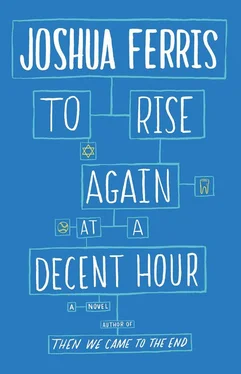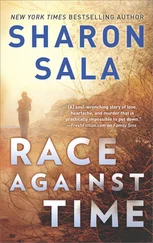“I’ll just take a few at random,” she said, and she began to read.
Of all the species of vanity man indulges in, none is so vain as worship
“What do you make of that?” she asked.
“I said that?”
“ ‘You’ said that. ‘You’ also said: ‘Freedom of religion in America is all fine and good until you start believing in nothing, and then it is a crime to be punished.’ ”
“Is that really under a hundred and forty characters?”
“Are you starting to see?” she asked me.
“See what?”
“This person on Twitter who’s not you? He sounds an awful lot like you.”
“You think it’s me? You think I’m doing this?”
“I’m just saying,” she said.
“Nobody who says she’s just saying is ever just saying,” I said. “It’s not me, Connie. I’m not even engaging.”
“You’ve been on your phone all morning.”
“It just so happens,” I said, “that we lost to Kansas City last night. It’s important for us all to debrief, okay? Let me see that thing.”
She handed me the iPad. I read:
The world whips us with scorn, we are chased to the edges, we approach the brink of extinction
“Did I write that, too?” I asked. She didn’t respond.
If you must bathe, do so no more than twice weekly, and never by full immersion
“How about that one?” I asked.
“That one…” She trailed off.
“I just hate it when people fully immerse,” I said.
“That one’s less likely,” she conceded.
“It’s not me, Connie,” I said, handing the iPad back to her.
But could I blame her? All those tweets were in my name.
The only Plotz to take me up on my offer for free dental care was Jeff, a distant cousin of Connie’s. Or so I thought when I made him the offer. As it turned out, he was just a neighbor from a long time ago. But he was still close to the Plotzes — or his family was close to the Plotzes. Stuart Plotz and Jeff’s father, Chad, were in business together (they owned a stationery store or manufactured paper or something).
Jeff was a reformed drug addict who now counseled fellow druggies at a state facility. The condition of his mouth was pretty much what you’d expect. It wasn’t the worst boca torcida I’d seen, but it wasn’t a bouquet of roses, either. Treating patients with a history of chemical dependence is no walk in the park. You can’t load them up on nitrous oxide and then send them off with a month’s supply of Percocet and Vicodin. Jeff and I agreed to keep his pain management confined to nonopioid analgesics, which meant he winced his way through an hour’s repair work while his lower body squirmed about like a zombie’s twitching back to life. I kept up a running commentary to calm him down. I told him who I was, I mean who I really was, in case he was interested, which I thought he might be, seeing how I was dating his cousin. (She wasn’t his cousin.) I hadn’t been able to tell any of the Plotzes who I really was, I mean the me who was himself when not around the Plotzes, because they were always busy being themselves, which is to say vociferous, strong willed, and insular. They were extraordinarily polite and welcoming, but in the long run there wasn’t much they cared to know about the new guy. If I had been part of a family like theirs, odds are I would not have had much time for the new guy, either. What could the new guy do for me that was not already being done by a dozen family members always ready to offer me their encouragement, criticism, advice, censure, and love, often in the same breath?
With Jeff in the chair, I could finally assert myself with a captive audience, albeit one bleeding excessively and staring in wide-eyed terror. I told him that I was first and foremost a Red Sox fan. I told him that my love of the Red Sox wasn’t uncomplicated. The single happiest night of my life came in October of 2004 when Mueller forced extra innings with a single to center field and, more spectacularly, David Ortiz homered in the bottom of the twelfth, halting a Yankees’ sweep of the American League Championship and initiating literally the most staggering comeback in sports history, culminating in a sweep of the St. Louis Cardinals to take the World Series. It was a validation of all those years of suffering, the cause of an unexpected euphoria, and a total cataclysm. Sometime in 2005, I told Jeff, the unlikely fact that the Red Sox had won finally sank in, and a malaise crept over me. I wasn’t prepared for the changes that accompanied the win — for instance, the sudden influx of new fans, none of them forged, as it were, in the fires of the team’s eighty-six-year losing streak. They were poseurs, I thought, carpetbaggers. With this new crop of fans I worried that we would forget the memory of loss across innumerable barren years and think no more of the scrappy self-preservation that was our defining characteristic in the face of humiliation and defeat. I worried we would start taking winning for granted. And I didn’t care for us poaching players and wielding power in the fashion of our enemy. It was difficult, I told Jeff, to find myself ambivalent, even critical, toward a team that had for years received from me nothing but unconditional devotion. We were underdogs, we knew only heartbreak and loss: how could I be expected to shift, practically overnight, to an attitude of entitlement? There was an Edenic weirdness to the whole thing, the same feeling that must have dogged Adam after Eve’s arrival: what should I wish for now? What should I want? I wanted the Red Sox to win the World Series more than anything in the world, I told Jeff, whose gum pockets were as loose as the dentures on a dockside whore, until they crushed the Yankees in truly historic fashion and swept the Cardinals, and then I wanted everything to go back to the way it was, so that I would know who I was, what made me, and what it was I’d always wanted.
Jeff said nothing in reply to this information, which was to be expected, given his circumstances. Now we were almost finished, and it occurred to me that he was going to walk out with one hell of a sore mouth. He would remember, not the free dental care, but the hour of torture he’d endured in my chair, and any report he’d make about me to another Plotz would dwell on my dispensation of pain. What I needed to do, I thought, was make him laugh. That way, he might remember that he and I had had some fun together.
“Do you know the one about the two German Jews who devised a plan to kill Hitler?” I asked.
He looked at me with his olive-gray eyes, the whites they swam in marred by red lightning from his years as a wastoid. I read in the look a sign to continue.
“These two fellows had it on good authority that Hitler was going to be at a particular restaurant in Berlin for a luncheon at noon sharp. So at eleven forty-five, they positioned themselves outside the restaurant and waited with guns hidden inside their pockets. Soon it was noon, but there was no sign of him. Five after twelve and there was no sign of him. Ten after, and then a quarter after, and still no sign of him. So the first guy says to the second guy, ‘He was supposed to be here at noon sharp. Where do you think he could be?’ ‘I don’t know,’ says the second guy, ‘but I sure hope he’s okay.’ ”
I thought I detected a smile from Jeff, but it’s always hard to tell through the instruments. Soon after, a tear fell from the corner of his eye, but it was probably more on account of discomfort. Abby, of course, was masked and nonresponsive, just waiting to hand off the instruments.
Afterward, Connie and I stood at the front desk, watching Jeff leave.
“I hated that guy growing up,” she said. “Fucking crackhead.”
I was taken aback. “You hated Jeff?”
Читать дальше












